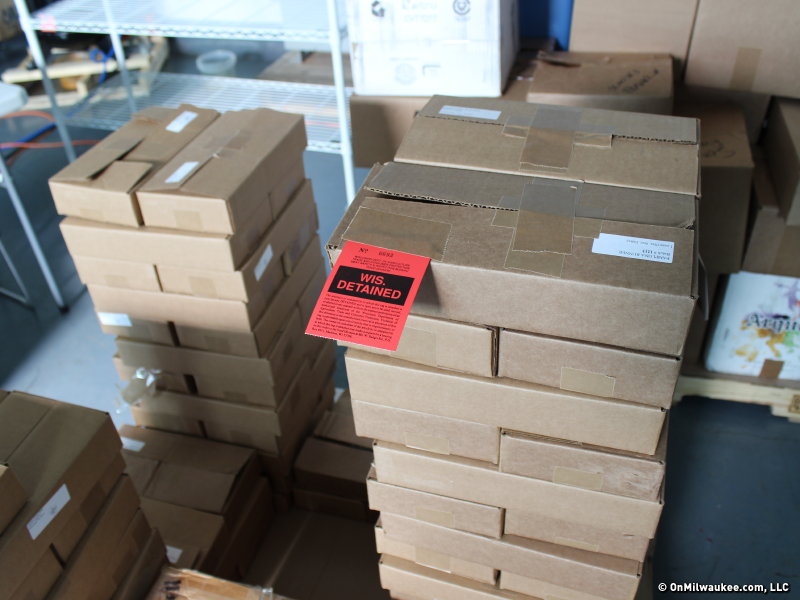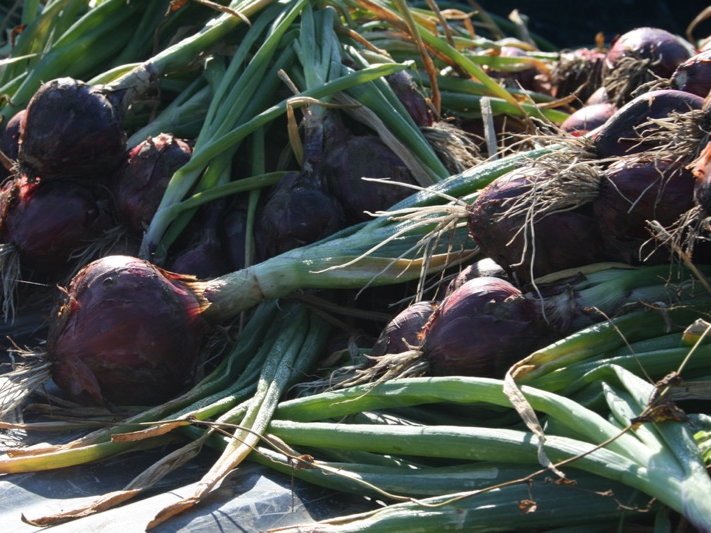What began as a seemingly simple labeling issue may lead to the closure of a popular Milwaukee-based small business.
Currently, thousands of pounds of Bolzano Artisan Meats salami – approximately $50,000 worth of product – is packed in boxes and sitting on the floor of the Holton Street meat plant.
It can’t be sold, due to a recall on the product – first enacted voluntarily and then recommended by the USDA this past month.
According to the recall notice issued by the Food Safety and Inspection Service on April 17, the product is detained for reasons of "misbranding and because they were produced without the benefit of federal inspection… The Products… incorrectly bear the Cooperative Interstate Shipment (CIS) program version of the USDA Mark of Inspection, which requires federal acceptance into the program. Because the establishment is not part of the CIS program, products they produced and distributed bearing the CIS program version of the USDA Mark of Inspection cannot be sold through interstate commerce."
The Cooperative Interstate Shipment program, which was authorized as part of the 2008 Farm Bill, was created specifically for the benefit of small businesses, those with 25 employees or less, in an effort to allow them to ship their products across State lines and export them to foreign countries.
Interstate shipment has important implications for local food producers and consumers – especially when one state has a major market right across its border, as is the case with southern Wisconsin and Chicago. Implementing CIS is part of USDA’s broader strategy to strengthen local and regional food systems and to help small and midsize producers access new market opportunities.
Scott Buer, owner of Bolzano Artisan Meats, says he founded the company with his wife Christin Johnstone-Buer in 2009, anticipating that the CIS program would be adopted in Wisconsin.
"The CIS program is part of the reason why we started our company," says Buer. "We were excited thinking that the program would make it easier for small companies to jump through the hurdles needed to gain USDA approval. And we had confidence that being able to work directly with the State would be a more collaborative process than working with the USDA."
Bolzano Artisan Meats was licensed by the State in August 2009, and by October of the same year it had produced its first batch of state-inspected cured meats.
The company started with the production of cured products like prosciutto, and has since switched over to the production of cured salami, based on consumer demand.
In September 2012, authorization for the CIS program was granted by the Wisconsin State legislature.
"We applied for the Cooperative Interstate Program and went through two separate audits," Johnstone-Buer says, as we discuss the process. "In February of 2013 we took part in a food safety audit, followed by a walk-through of the plant in June 2013, with both state and USDA inspectors present. By the time of the walk-through, we already had approval for the USDA labeling."
"We completed all the necessary steps for the process," says Buer. "But now the State is telling us we’re not part of the program. It’s very frustrating… and it’s an issue of WDATCP not actively communicating with plants, and even going out of their way to stop or slow down communication with plants, when cooperation is so necessary."
When asked about Bolzano’s acceptance into the CIS program, the Department of Agriculture, Trade and Consumer Protection (DATCAP) spokesperson, Jim Dick responded by email: "Anything to do with final CIS acceptance and the product recall issue is strictly in the hands of the USDA’s Food Safety Inspection Service (FSIS)."
Edward Stoker, Congressional and Public Affairs representative for FSIS, indicated by phone that at the time of the recall, Bolzano Artisan Meats had not yet been accepted into the CIS program.
"No decision has been made regarding Bolzano’s application for the CIS program at this time," he said.
The Buers emphasize that they’ve always gone above and beyond when it comes to meeting and exceeding state specifications for food safety and compliance in their business.
"We’re doing something that is complex. If we don’t do it correctly it’s a big deal. So, we take the food safety very seriously," Johnstone-Buer says. "Every day that we’re in production – any time we are touching, measuring for food safety, packaging meat – a state inspector is here."
Like every other meat plant in the state, Bolzano functions under the auspices of a Hazard Analysis and Critical Control Points plan (HACCP).
"There is paperwork to monitor and verify that you’re abiding by the standards," says Johnstone-Buer. "We’re required by law to do a reassessment of our HACCP plan every year, but it’s often more frequent. If we get new equipment or change anything about the way we operate, it requires us to file an amendment to our plan."
According to the Buers, their production is based on scientific processes rooted in scholarly, peer-reviewed research, particularly that of scientists at UW-Madison.
"Because we’re doing something that’s not all that common, we always double checked with scientists if there were any questions," Buer says. "We’re always documenting our practices, making changes and having dialog with our inspectors. We’ve always had a good mindset that audits improve our processes and that any criticism we receive during our audits or inspections is used to make our operations better."
But, despite what the Buers describe as strict, regimented compliance, they say that their relationship with the officials at the Wisconsin Department of Agriculture, Trade and Consumer Protection has gradually soured.
"Over the past few months, our inspections have gotten more and more antagonistic," says Buer. "They began to give us a hard time for working production on weekends, even though we were paying the inspectors overtime to work on the weekend."
The couple say they were growing tired of constant battles with State authorities, so they decided to make the jump and apply for USDA inspection.
"We began the application for USDA in January," says Johnstone-Buer. "But, now we can’t move forward with that until we have things cleared up with the state. As we started working more and more with the USDA, we began to experience a delayed response with paperwork, forms and information from the state of Wisconsin."
"Things just weren’t adding up," adds Buer. "On April 10th, they informed us that we weren’t officially approved for Interstate Cooperative. So, the USDA advised us to get the product back and properly label it. ‘If the state says so, it’s their program, you should recall it,’ they said."
At that point, Bolzano sent out an email alert to all of their wholesale accounts, and in the days following, they say they confirmed that everyone got a copy of the recall and were pulling their stock from the shelves."
"Once we started getting things back from wholesalers, we had a conversation with all of the powers that be at the USDA," says Johnstone-Buer. "They looked over our records, and declared it to be safe, but that we needed to recall the mislabeled product and work with the state to get things re-labeled."
But, according to the Buers, when the couple tried to schedule a time for relabeling, the state refused, saying that the recalled product did not meet safety standards.
"We had new product that we were scheduled to package on the 11th of April, but – because it was retained by the state – were unable to package it until the 15th," Johnstone-Buer explains. "And we only got that far with the help of the Farm to Consumer Legal Defense Fund."
Currently, no permission has been granted for Bolzano to put the new batch of product up for sale. In fact, the state has now suspended the company’s food-processing license.
"They are now looking at our HACCP plan and criticizing parts of it that have been in place for months," Buer says. "It gets really technical, but basically we gave them all our HACCP changes, in minute detail, several times, and documented doing so, and the state essentialy saying that they did not have any obligation to look at them, and can retroactively declare they have problems with the plans."
Johnstone-Buer nods. "It’s no longer about food safety," she says. "The level of antagonism is really against the idea that HACCP was founded upon – which is a culture of collaboration and continuous improvement. We feel we’re being treated like the enemy – and we’re not the enemy."
When asked about the license suspension, DATCAP spokesperson, Jim Dick responded: "Bolzano changed the way it processes its product but did not log and document the changes for verification as required under a HACCP plan.
"A HACCP Plan is a self-assessment plan for the operator," Dick goes on. "The inspectors are there to verify the documented measures taken by a plant. During this recent safety assessment check it was discovered changes in the processing procedures were made but these changes were not measured and then documented, so they could not be verified to assure the safety of the most recently produced product."
Dick also indicated that the inspection that led to the current suspension came after the recall on Bolzano salami. The federal action is categorized as a "Class II" recall, described as "a health hazard situation where there is a remote probability of adverse health consequences from the use of the product."
The Buers, who have gone without an income for nearly a month, say that they see no other options but to shut down their business.
"We don’t have big fancy legal departments and R&D departments and lobbyists," says Buer. "In the short term, we’ve been devastated. Right now, even if the state came back to us and said that everything was fine, the company has been damaged enough that we’d essentially be starting from scratch.
"We would really like resolution to the issues. We don’t know if there have been politics (with a small p) or Politics (with a big P) going on. But, what ultimately is a simple labeling issue has become something larger."
Bolzano Artisan Meats has lauched a crowdsourcing campaign on IndieGoGo to cover legal fees and assist them in fighting the State. Read more or give at igg.me/at/freethesalami.
As a passionate champion of the local dining scene, Lori has reimagined the restaurant critic's role into that of a trusted dining concierge, guiding food lovers to delightful culinary discoveries and memorable experiences.
Lori is an avid cook whose accrual of condiments and spices is rivaled only by her cookbook collection. Her passion for the culinary industry was birthed while balancing A&W root beer mugs as a teenage carhop, fed by insatiable curiosity and fueled by the people whose stories entwine with every dish. Lori is the author of two books: the "Wisconsin Field to Fork" cookbook and "Milwaukee Food". Her work has garnered journalism awards from entities including the Milwaukee Press Club. In 2024, Lori was honored with a "Top 20 Women in Hospitality to Watch" award by the Wisconsin Restaurant Association.
When she’s not eating, photographing food, writing or planning for TV and radio spots, you’ll find Lori seeking out adventures with her husband Paul, traveling, cooking, reading, learning, snuggling with her cats and looking for ways to make a difference.







